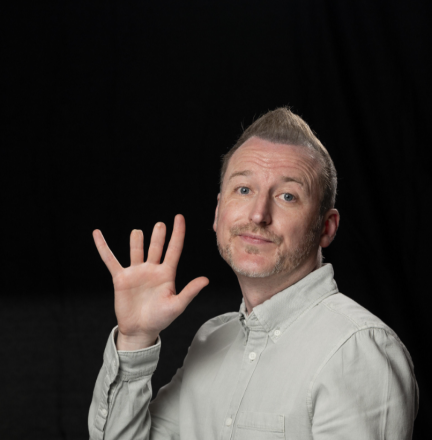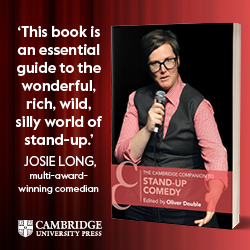
Scottish comedian Stuart Mitchell is one of the UK’s top TikTok stars with over 100 million views. He is setting out on his debut tour Tips Not Included in Spring 2025, making audiences laugh with his skilful mix of quickfire crowdwork, well-crafted gags and skilful storytelling, talking about the loss of his parents and how laughter is sometimes the only way to make it through difficult times.
Mitchell, who was born in 1982 and grew up in Linlithgow and then Uddingston, recently fronted his own Radio 4 series The Cost of Living and stars in the podcast Glesga Da Podcast with Raymond Mearns. But he is not your typical comedian. Read about his remarkable journey from would-be politician to stand-up star and how he turned tragedy into triumph below.
Stuart Mitchell's tour starts on 28 March at Kilbarchan, Performing Arts Centre. Due to exceptional demand new dates are being added. Click here for all current dates and tickets: https://stuartmitchellcomedy.com/links/
Please explain the title of Tips Not Included, about losing the tips of your fingers. You joked onstage: "I went to a very rough school. I lost them in a game of rock paper and scissors..."
This is my first childhood memory, being four and losing the tips of two fingers. It was a He-Man sword that I dropped down the drain. My friend picked up the drain lid and then let it fall in my hand. I remember getting rushed to the hospital and lots of commotion. My mum had post-natal depression and always blamed herself. She eventually she took her life in 1989.
You've said that through the darkness you've tried to see the light..
Both my parents were dead by the time I was 32. I think with my mum and dad's life expectancy, I was due to die last Tuesday. But I've always looked at life as positively as I can do. It seemed that everyone always said 'oh, you've had a terrible life,' whereas I've always tried to take that and flip it. I've had an amazing life and I'm in the best place I've ever been now.
You've certainly had an interesting life. Your first job was working for the Treasury...
My uncle Bob put a bet on that I would be Chancellor of the Exchequer one day, and I think he got 500 to 1. I absolutely believed that I would go into politics, but I started to question what went on there and with all the subsidised bars and food.
And then you went into banking in Glasgow. Fancy cars, lavish lifestyle. You say you weren't the Wolf of Wall Street, you were the Badger of Buchanan Street.
My bonus was all that mattered to me. But after my dad died you realise that all it means nothing. That was what my BBC Radio 4 series The Cost of Living was about. Living your life the way you should rather than how you believe you should according to social media. I had all the things people dream of, but when your parents both go, all you really want is not sitting in the driveway, it's what's within you. The money was fantastic but I was in the darkest place I've ever been.
The irony is that you are critical of social media but your breakthrough has come through your viral posts...
Yes, it wasn't until I went on social media that things really started developing. But I've always believed in myself and that's certainly shown in terms of the message getting out there. I find it surreal that in a week, more people could have watched me online than saw Live at the Apollo. I mean I like to say that as i've never been asked to do Live at the Apollo. Maybe one day..."
It was the bank job that got you into comedy...
The bank wanted to send me on a course as part of my qualifications. There was a stand-up comedy course at the college as well and I was more interested in that. I remembered seeing Ed Byrne when I was at Stirling Univeristy studying economics and I always wondered how you got into stand-up. The tutor said I should keep this up. And that's when I just started plugging away.
You started soon after the crash in 2008 but are now at the forefront of comedians packing out venues via TikTok rather than TV.
This tour is nuts. Many of my Scottish tour dates sold out less than a week after going on sale. We are already looking to add extra shows.It's replicating my success online. It's madness that you play the Edinburgh Fringe to six people and then the following year you're selling out. There's nothing better and more privileged than standing onstage and giving people a good laugh, especially in these times.
Your appeal is finding humour in both serious subjects such as death, sharing your own experiences, and also finding gags in everyday issues such as marriage and parenthood. You've got a friendly style that helps you to come across as very likable onstage...
...And hopefully likable offstage too! My audience almost see me as a pal. I'm quite interactive with my fans. I reply a lot to them on a private message basis. It's always nice to help people not only to have a laugh onstage, but if they need somebody to reach out to offstage as well.
How easy was your transition from online success to live stand-up success?
You tend to see something online and you go and see their full show and you maybe think, that wasn't as good as what I saw online, but with me I've got experience. I played Jongleurs, The Comedy Store, the Banana Club in London and have gigged in the US, Middle East and Australia. I also spent time in Las Vegas being mentored and coached by some of the top late night TV gag writers. It was the best investment i’ve made. I’ve done all the groundwork.
Things could have turned out differently though. You nearly became an actor...
In 2015 I got a part in the BBC drama Shetland. I was due to fly out but then my dad, who was ill, started to deteriorate. I was literally walking down the stairs. I had my bag over my shoulder and was hugging my stepmum and then the hospital rang. I had to call them and tell them I wasn't coming.
But then you were asked to be on the BBC Scotland topical panel show Breaking The News, which has showcased the talents of so many stand-up stars. In fact you are now the longest-running panellist.
I did my first ever episode the week after my dad was cremated. I had my dad's last ever wrapper from a sweetie he had days before he died in my jacket pocket. I have it on stage with me at every gig.
You are a big comedy fan. Who are your heroes?
Lee Mack was always one that I loved. People say I look like him - I wish I had as many tour dates as him! I'm quite analytic so I studied him in terms of his style and his delivery. Jimmy Carr as well. He's a pinnacle for me. He's just an absolute machine when it comes to turning out material.
You are drawing on dealing with your father's death for your next BBC Radio series is The Cost of Dying...
It is literally about going through my dad's paperwork and seeing how much it cost him to die in terms of the financial impact that that had not only in him but also on the family and how much it cost to wind down his estate.
Your life has certainly changed since those days working in finance. It's as if comedy saved you.
It's just always striving to be the best person you can possibly be. I know it sounds a bit of a cliche, but I'm totally a different person. I look back and it's almost like a reincarnation.
Picture: Young Media



